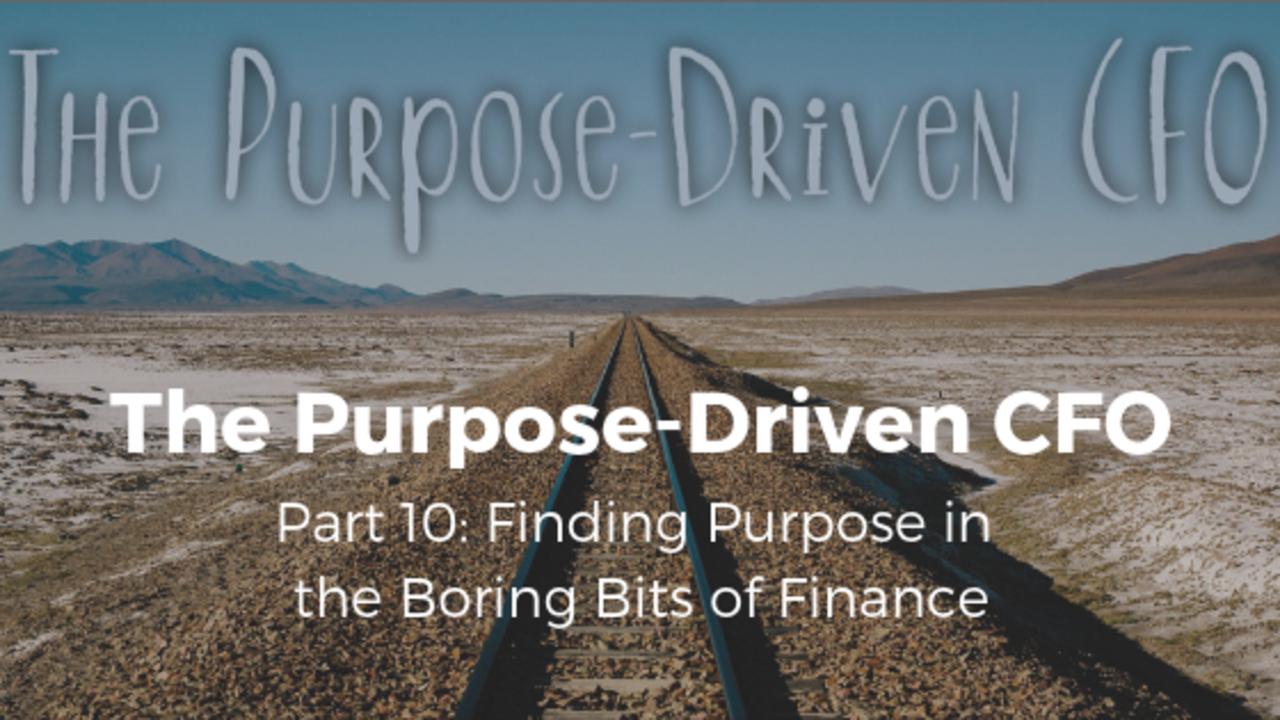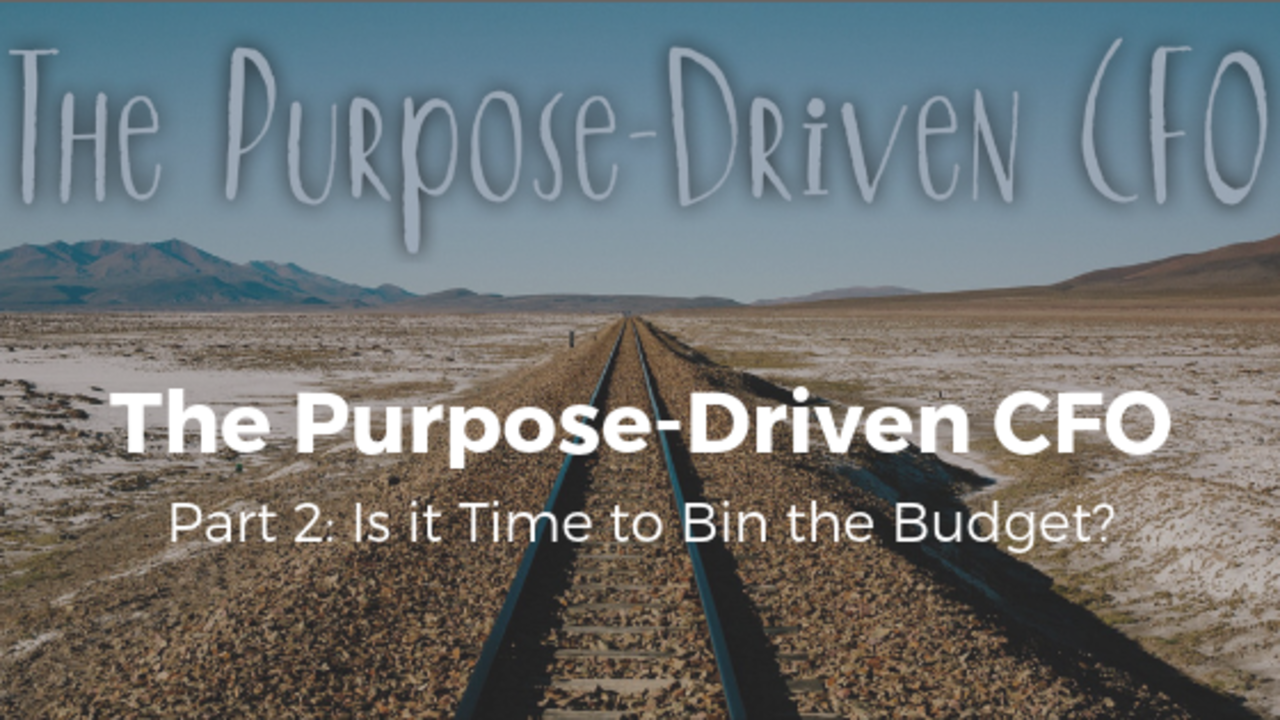Four Lessons for Finance from an Entrepreneur

By Andy Burrows
I started Supercharged Finance in September 2016. It’s my business.
But I’m also a seasoned Finance professional, with 25 years’ experience, including a period as a Finance Director.
I worked in Finance teams, big and small, for most of my career, and then I decided to set up a business of my own. So, I guess that makes me an entrepreneur!
And I’ve felt for a while that if you want to be a good CFO or a good Finance business partner, then starting your own business teaches you important lessons.
The question as a Finance professional, as a CFO or Finance business partner is, “if it was you who owned or invested in this business, how would you run it?”
And what I’ve found is that when it’s your own business – when it’s your baby – as someone trained and experienced in Finance, you definitely use that experience, but there are some things that you start to see more clearly and do differently. Here are four!
Lesson 1 - Finance is not just numbers, it’s personal
Fir...
Let's stop messing about with project budgeting!

By Andy Burrows
Budgeting creates problems for projects in business.
Projects are often something of an anomaly for Finance when it comes to expenditure control and resource allocation. At least that’s the way that it’s felt.
The problem, however, is really budgetary control.
When I was doing management reporting for functional expenditure areas, that’s what I used to feel with projects.
And the problem was that we were trying to manage project expenditure in the same way as every other kind of expenditure.
We’d create cost centres for projects as if they were business departments. That would mean the nomination of a cost centre manager, and the inclusion of the project costs within the ‘actual vs budget’ variance analysis each month for each function.
When it came to forecasts, we’d collate the data in the same way as every other cost centre. And we’d challenge their forecasts, and their spending against budget in the same way as every other cost centre.
And that meant project...
5 Ways that CFOs Can Radically Improve the Effectiveness of Exec Meetings

By Andy Burrows, 22 October 2018
During my career, I’ve sometimes worked at the top level in Finance, and had the privilege of sitting alongside other functional heads in the “Senior Management Team” or “The Exec”, or even “The Board of Directors”.
Obviously one of the chief ways we stayed in touch with each other, and with what was going on, was to have “Management Meetings” on a regular basis. Normally, the main meeting would be once a month, centred around the management accounts. And sometimes we would also have weekly, less formal meetings.
When you’re more junior, you see the FD or the CFO going off to these meetings. And you have a picture in your mind of what goes on. You picture high powered discussions, with quality arguments and analysis, talking strategy and making sensible decisions.
The reality is often quite different. The meetings are often frustrating, boring and nowhere near as useful as they should be. Discussions over “matters arising” or “actions brought forwar...
The Purpose-Driven CFO Part 10: Finding purpose in the boring bits of Finance

By Andy Burrows
[First published 26th December 2017]
[This article is also on LinkedIn - why not "Follow+" Andy and give the article a "like"?]
I haven’t written in this series for a while. So, for new readers, I’ll just briefly reiterate the premise of The Purpose-Driven CFO.
What I set out to do was to investigate what difference it makes going back to first principles with the things we do in Finance, and asking “why?” I know from experience that understanding why we do things can increase our motivation in doing them. Once you can see the end goal, and see the benefits of that goal, any tedious, mundane, difficult or complex steps towards it become less burdensome. And often asking “why” reveals implications that will change the way we do things. That has certainly been the case with all the other areas I’ve looked at from this angle.
You can find links to the previous articles at the end.
What I’m considering today is what I’m calling the “boring bits”. Sorry if anyone fin...
The Purpose-Driven CFO Part 2: Is it Time to Bin the Budget?

By Andy Burrows
[First published 9 February 2017]
[This article is also on LinkedIn - why not "Follow+" Andy and give the article a "like"?]
This is part of a series of articles looking at Finance activities, and basically asking 'why?' The premise is that understanding why we do things helps us to do them better. It may even fundamentally change the way that we do them. If you haven't seen it already, take a look at the introductory article that explains the approach I'm taking: The Purpose-Driven CFO Part 1: Introduction
The Budget – What’s it for?
In this second article in my series on Purpose-Driven Finance, I want to focus on one of the most widespread headaches that the CFO has to manage – the budget.
Of all the energy-sapping, life-draining, activities in Finance, the annual budget process seems to be the most hated. In almost every big business I’ve worked with, anyone involved in the annual budget process has had complaints about it. And the accountants, by the end of th...




